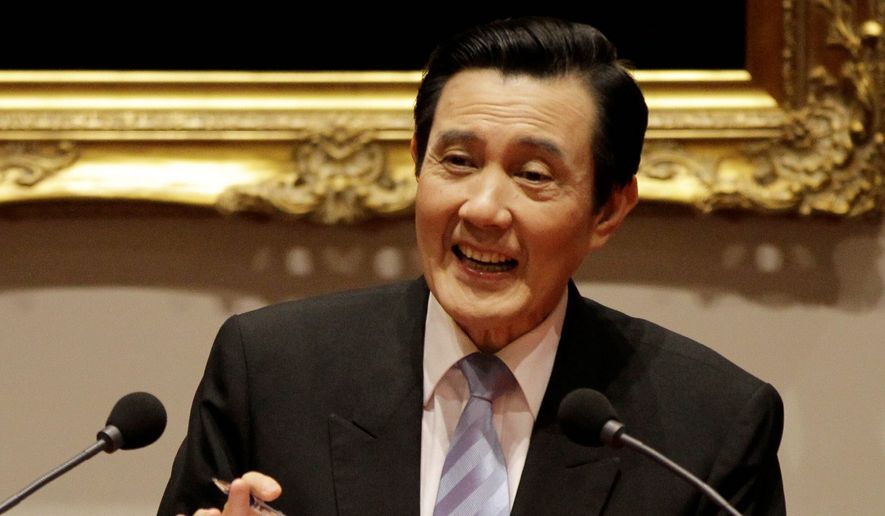A top Taiwanese development official says Taipei is optimistic the Republican takeover of the U.S. Senate will accelerate Washington’s pursuit of a free trade pact between the West and Asia, and is hopeful about the prospects of a direct U.S.-Taiwan deal.
The U.S.-Taiwan Bilateral Investment Agreement has been held up by a dispute over standards for U.S. beef shipped to Taiwan, but Taiwanese National Development Council Minister Kuan Chung-ming says Taipei is “seriously considering a new meat import mechanism” to satisfy U.S. demands.
Mr. Kuan made the comment in an exclusive interview with The Washington Times, during which he said overall feelings among Taiwanese leaders in response to the U.S. elections this month are that the time ripe to push for broader free trade with the United States.
He stressed Taiwan’s desire to be included in talks in the proposed Trans-Pacific Partnership — an 11-nation pact the Obama administration has pushed to expand free trade between the Western Hemisphere and Asia.
Analysts generally agree that TTP talks have been bogged down because the Democrat-led Senate — under pressure from the party’s anti-free trade wing — has refused to hold a vote to give “fast-track negotiating authority” to the Obama White House.
Such authority would allow the administration to negotiate final terms of the TPP with other nations without having Congress debate those terms and add amendments. Without it, the administration is hampered in convincing other nations it can push a final deal through Congress.
SEE ALSO: Hong Kong democracy protesters clash with police
Mr. Kuan expressed optimism that a GOP-controlled Senate will push through the authority.
“In the current situation where the Republicans will be controlling both the House and the Senate, it of course gives us a little more hope that more trade negotiations will be more encouraged in Washington,” he said. “Perhaps the United States will be willing to push harder for [the] TPP.”
The Obama administration has suggested a key purpose of the TPP is to bolster smaller nations in Asia against Chinese economic hegemony — an assessment Mr. Kuan seemed to agree with when he spoke with The Washington Times last week.
However, Taiwan is not involved in TPP negotiations, a situation that finds the island an awkward economic position between Beijing and the West.
Taiwanese President Ma Ying-jeou has pushed for increased economic ties with China. While Taipei and Beijing remain political adversaries, nearly 40 percent of Taiwan’s foreign trade is with China, totaling $167 billion last year.
With the island democracy engaging in complex economic ties with communist China, some Taiwanese officials have pleaded for U.S. leaders to vocally support Taiwan’s inclusion in Western-backed institutions on the world stage.
SEE ALSO: Inside China: China pushes Taiwan on ‘one country’ scheme
In an interview with The Times in April, Taiwan’s top diplomat in Washington, Shen Lyu-shun, said “the more we engage with mainland China, the more support we need from the United States.”
Mr. Kuan struck a similar chord.
Despite its increased trade with China, Taipei is working overtime to expand free-market opportunities in its economy, he said, citing new “free economic pilot zones” designed to “emphasize deregulation” and create an “ecosystem” for American and foreign venture capital in Taiwan.
The nation of fewer than 25 million people is the U.S.’ 11th-largest trading partner, but Mr. Kuan stressed that Taipei wants to grow the relationship.
While TPP talks remain on the horizon, the bilateral deal may be the best place to start, Mr. Kuan said.
The deal remains mired in disagreements over U.S. beef. Taiwanese lawmakers have sought to restrict the sale of U.S. beef on grounds that it is laden with a leanness-promoting drug called ractopamine. U.S. lawmakers argue the additive is safe and that there is no scientific reason or international standard for Taiwan to set limits on it.
The standoff has placed on the back burner all other aspects of the bilateral deal, such as expanded pharmaceutical industry trade between the U.S. and Taiwan.
The situation does not sit well with Mr. Kuan, who says Taiwan is eager to move forward.
“The message that I can convey here is that our government has been working hard to establish [meat import] standards to be in line with international standards with scientific evidence,” he said. “Hopefully, at least then, Taiwan and the U.S. will be able to really push this forward, rather than get stuck by these meat issues.”
• Guy Taylor can be reached at gtaylor@washingtontimes.com.




Please read our comment policy before commenting.